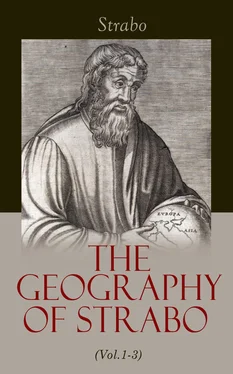Strabo - The Geography of Strabo (Vol.1-3)
Здесь есть возможность читать онлайн «Strabo - The Geography of Strabo (Vol.1-3)» — ознакомительный отрывок электронной книги совершенно бесплатно, а после прочтения отрывка купить полную версию. В некоторых случаях можно слушать аудио, скачать через торрент в формате fb2 и присутствует краткое содержание. Жанр: unrecognised, на английском языке. Описание произведения, (предисловие) а так же отзывы посетителей доступны на портале библиотеки ЛибКат.
- Название:The Geography of Strabo (Vol.1-3)
- Автор:
- Жанр:
- Год:неизвестен
- ISBN:нет данных
- Рейтинг книги:3 / 5. Голосов: 1
-
Избранное:Добавить в избранное
- Отзывы:
-
Ваша оценка:
- 60
- 1
- 2
- 3
- 4
- 5
The Geography of Strabo (Vol.1-3): краткое содержание, описание и аннотация
Предлагаем к чтению аннотацию, описание, краткое содержание или предисловие (зависит от того, что написал сам автор книги «The Geography of Strabo (Vol.1-3)»). Если вы не нашли необходимую информацию о книге — напишите в комментариях, мы постараемся отыскать её.
The Geography of Strabo (Vol.1-3) — читать онлайн ознакомительный отрывок
Ниже представлен текст книги, разбитый по страницам. Система сохранения места последней прочитанной страницы, позволяет с удобством читать онлайн бесплатно книгу «The Geography of Strabo (Vol.1-3)», без необходимости каждый раз заново искать на чём Вы остановились. Поставьте закладку, и сможете в любой момент перейти на страницу, на которой закончили чтение.
Интервал:
Закладка:
9. Posidonius, in praising the amount and excellence of the metals, cannot refrain from his accustomed rhetoric, and becomes quite enthusiastic in exaggeration. He tells us we are not to disbelieve the fable, that formerly the forests having been set on fire, the earth, which was loaded with silver and gold, melted, and threw up these metals to the surface, forasmuch as every mountain and wooded hill seemed to be heaped up with money by a lavish fortune. Altogether (he remarks) any one seeing these places, could only describe them as the inexhaustible treasuries of nature, or the unfailing exchequer of some potentate; for not only, he tells us, is this land rich itself, but riches abound beneath it. So that amongst these people the subterraneous regions should not be regarded as the realms of Pluto, but of Plutus. Such is the flourished style in which he speaks on this subject, that you would fancy his turgid language had been dug from a mine itself. Discoursing on the diligence of the miners, he applies to them the remark [of Demetrius] of Phalaris, who, speaking of the silver mines of Attica, said that the men there dug with as much energy as if they thought they could grub up Plutus himself. He compares with these the activity and diligence of the Turdetani, who are in the habit of cutting tortuous and deep tunnels, and draining the streams which they frequently encounter by means of Egyptian screws. 1078As for the rest, 1079they are quite different from the Attic miners, whose mining (he remarks) may be justly compared to that enigma, 1080What I have taken up I have not kept, and what I have got I have thrown away. Whereas the Turdetanians make a good profit, since a fourth part of the ore which they extract from the copper mines is [pure] copper, while from the silver mines one person has taken as much as a Eubœan talent. He says that tin is not found upon the surface, as authors commonly relate, but that it is dug up; and that it is produced both in places among the barbarians who dwell beyond the Lusitanians and in the islands Cassiterides; and that from the Britannic Islands it is carried to Marseilles. Amongst the Artabri, 1081who are the last of the Lusitanians towards the north and west, he tells us that the earth is powdered with silver, tin, and white gold, that is, mixed with silver, the earth having been brought down by the rivers: this the women scrape up with spades, and wash in sieves, woven after the fashion of baskets. Such is the [Pg 222] [CAS. 147] substance of what [Posidonius] tells us concerning the mines [of Iberia].
10. Polybius, speaking of the silver mines of New Carthage, 1082tells us that they are extremely large, distant from the city about 20 stadia, and occupy a circuit of 400 stadia, that there are 40,000 men regularly engaged in them, and that they yield daily to the Roman people [a revenue of] 25,000 drachmæ. The rest of the process I pass over, as it is too long, but as for the silver ore collected, he tells us that it is broken up, and sifted through sieves over water; that what remains is to be again broken, and the water having been strained off, it is to be sifted and broken a third time. The dregs which remain after the fifth time are to be melted, and the lead being poured off, the silver is obtained pure. These silver mines still exist; however they are no longer the property of the state, neither these nor those elsewhere, but are possessed by private individuals. The gold mines, on the contrary, nearly all belong to the state. Both at Castlon 1083and other places there are singular lead mines worked. They contain a small proportion of silver, but not sufficient to pay for the expense of refining.
11. Not far from Castlon is the mountain in which they report that the [river] Guadalquiver 1084takes its rise. They call it silver mountain on account of the silver mines which it contains. 1085Polybius asserts that both the Guadiana 1086and this river have their sources in Keltiberia, notwithstanding they are separated from each other by a distance of 900 stadia; 1087[this we are to attribute to] the Keltiberians having increased in power, and having consequently conferred their name on the surrounding country. It appears the ancients knew the Guadalquiver under the name of the Tartessus, and Gades 1088with the neighbouring islands under that of Erythia; and it is thought that we should understand in this sense the words of Stesichorus 1089concerning the pastoral poet Geryon, that he was born “almost opposite to the renowned Erythia, in a rocky cave near to the abundant springs of the silver-bedded river Tartessus.” They say that on the piece of land enclosed between the two outlets of this river there formerly stood a city named, like the river, Tartessus, and that the district was called Tartessis, which the Turduli now inhabit. Eratosthenes likewise tells us that the [country] near to Calpe 1090was called Tartessis, and also Erythia the Fortunate Island. This Artemidorus contradicts, and says that it is as false as his other statements, that the Sacred Promontory 1091is distant from Gades 1092five days’ sail, when in fact they are [distant from each other] not more than 1700 stadia. 1093Likewise that the tide ceased at this point, whereas it passes round the whole circuit of the habitable earth. That it is easier to pass from the northern parts of Iberia into Keltica, 1094than to proceed thither by sea; with many other things which he asserted on the faith of that charlatan Pytheas.
12. Our poet [Homer] being very explicit, and possessing great experience, gives one cause to believe that he was not unfamiliar with these localities. Of this any one may be convinced who will examine carefully what has been written on these points, both the incorrect [comments], and likewise those which are better and more truthful. One amongst these incorrect ideas is, that he considered [Tartessis] to be the farthest country towards the west, where, as he himself expresses it,
The radiant sun in ocean sank,
Drawing night after him o’er all the earth. 1095
Now, since it is evident that night is ominous, and near to Hades, and Hades to Tartarus, it seems probable that [Homer], having heard of Tartessus, took thence the name of Tartarus to distinguish the farthest of the places beneath the earth, also embellishing it with fable in virtue of the poetic licence. In the same way, knowing that the Cimmerians dwelt in northern and dismal territories near to the Bosphorus, he located them [Pg 224]
[CAS. 149] in the vicinity of Hades; perhaps also on account of the common hatred of the Ionians against this people. For they say that in the time of Homer, or a little before, the Cimmerians made an incursion as far as Æolia and Ionia. Always drawing his fables from certain real facts, his Planetæ 1096are modelled on the Cyaneæ. He describes them as dangerous rocks, as they tell us the Cyaneæan rocks are, [and] on which account [in fact] they are called Symplegades. 1097He adds to this [the account of] Jason’s navigating through the midst of them. The Straits of the Pillars 1098and Sicily, 1099likewise, suggested to him the fable of the Planetæ. Thus, even according to the worst comments, from the fiction of Tartarus any one might gather that Homer was acquainted with the regions about Tartessus.
13. Of these facts, notwithstanding, there are better proofs. For instance, the expeditions of Hercules and the Phœnicians to this country were evidence to him of the wealth and luxury of the people. They fell so entirely under the dominion of the Phœnicians, that at the present day almost the whole of the cities of Turdetania and the neighbouring places are inhabited by them. It also seems to me that the expedition of Ulysses hither, as it took place and was recorded, was the foundation both of his Odyssey and Iliad, which he framed upon facts collected into a poem, and embellished as usual with poetical mythology. It is not only in Italy, Sicily, and a few other places that vestiges of these [events] occur; even in Iberia a city is shown named Ulyssea, 1100also a temple of Minerva, and a myriad other traces both of the wandering of Ulysses and also of other survivors of the Trojan war, which was equally fatal to the vanquished and those who took Troy. These latter in fact gained a Cadmean victory, 1101for their homes were destroyed, and the portion of booty which fell to each was exceedingly minute. Consequently not only those who had survived the perils [of their country], but the Greeks as well, betook themselves to piracy, the former because they had been pillaged of every thing; the latter, on account of the shame which each one anticipated to himself:
Читать дальшеИнтервал:
Закладка:
Похожие книги на «The Geography of Strabo (Vol.1-3)»
Представляем Вашему вниманию похожие книги на «The Geography of Strabo (Vol.1-3)» списком для выбора. Мы отобрали схожую по названию и смыслу литературу в надежде предоставить читателям больше вариантов отыскать новые, интересные, ещё непрочитанные произведения.
Обсуждение, отзывы о книге «The Geography of Strabo (Vol.1-3)» и просто собственные мнения читателей. Оставьте ваши комментарии, напишите, что Вы думаете о произведении, его смысле или главных героях. Укажите что конкретно понравилось, а что нет, и почему Вы так считаете.












![Anne Blunt - A Pilgrimage to Nejd, the Cradle of the Arab Race. Vol. 2 [of 2]](/books/750183/anne-blunt-a-pilgrimage-to-nejd-the-cradle-of-the-thumb.webp)